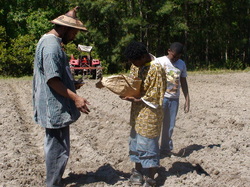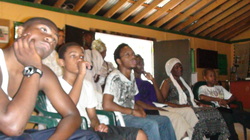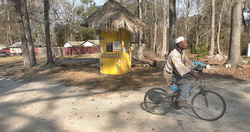Beaufort Gazzette
It takes a village

Saturday, Feb. 14, 2009
Oba Adefanmi II, king of the Oyotunji African Village in Sheldon, invites all of Beaufort County to the 50th anniversary of the Orisha Initiation begining Friday, February 13.The king, Oba Adefunmi II, walks through his living quarters and through the Ogun Temple grounds as Olaytan Apena sings and two young men follow close behind.
The group walks into a worship area of the Oyotunji African village, nestled behind woods just off U.S. 21 in Sheldon.
Oba Adefunmi II, shaded with an umbrella and walking with an elaborately beaded cane, sits on a black chair. He leans his head back and relaxes his hand on the colorful cane as Apena stops singing.
Draped in a black and red studded robe, Oba Adefunmi II, the son of the founder of the Oyotunji village, speaks in the Yoruba language. He talked about how the work of his father, the first Oba Adefunmi, was dedicated to the West African Yoruba culture, which originates in Nigeria.
This weekend, the Oyotunji village will celebrate African culture and the 50th anniversary of Oba Adefunmi I’s initiation into the Yoruba priesthood. The celebration begins Friday night with a concert with other events scheduled through the weekend.
Celebrations are far from unusual at the Oyotunji village, which conducts 14 festivals a year and depends upon its visitors for income.
The settlement long has been a place of curiosities — animal sacrifices, ritual facial scarring and the polygamy of Oba Adefunmi I once drew national attention, including a crew from “60 Minutes” in 1986.
Oba Adefanmi II, king of the Oyotunji African Village in Sheldon, invites all of Beaufort County to the 50th anniversary of the Orisha Initiation begining Friday, February 13.The king, Oba Adefunmi II, walks through his living quarters and through the Ogun Temple grounds as Olaytan Apena sings and two young men follow close behind.
The group walks into a worship area of the Oyotunji African village, nestled behind woods just off U.S. 21 in Sheldon.
Oba Adefunmi II, shaded with an umbrella and walking with an elaborately beaded cane, sits on a black chair. He leans his head back and relaxes his hand on the colorful cane as Apena stops singing.
Draped in a black and red studded robe, Oba Adefunmi II, the son of the founder of the Oyotunji village, speaks in the Yoruba language. He talked about how the work of his father, the first Oba Adefunmi, was dedicated to the West African Yoruba culture, which originates in Nigeria.
This weekend, the Oyotunji village will celebrate African culture and the 50th anniversary of Oba Adefunmi I’s initiation into the Yoruba priesthood. The celebration begins Friday night with a concert with other events scheduled through the weekend.
Celebrations are far from unusual at the Oyotunji village, which conducts 14 festivals a year and depends upon its visitors for income.
The settlement long has been a place of curiosities — animal sacrifices, ritual facial scarring and the polygamy of Oba Adefunmi I once drew national attention, including a crew from “60 Minutes” in 1986.
It takes a village

Iya Oriduwa discuss plans for the upcoming festival scheduled for this weekend to celebrate the villiages 50th anniversary of its Orisha Initiation. Oriduwa placed fresh flowers at the Great MotherÕs shrine. The shrine is dedicated to all the great mothers of Nigeria.Oba Adefunmi I’s claim that his village was an independent nation, not a part of the United States, further fueled speculation the Oyotunji community was evading taxes or harboring a cult.
“There are those who were afraid of the African village. It has intrigued and scared people,” said Oba Adefunmi II. “We want to get rid of that stigma.”
HONORING ANCESTORS
Baba Akinwan, a priest and tour guide, leisurely pedals his bike from his residence to the market place, a small courtyard squared in by pale, red stucco houses with tin roofs. Humming along with the tribal music pumping from speakers mounted on the exterior of the buildings, he dismounts his bike and parks it against a picnic table.
Sporting sunglasses, a red cotton robe with matching pants and gray dreadlocks, Akinwan explains the mission of the Oyotunji village: Teaching other African-Americans about their cultural history.
“Ancestors are important,” he said. “We try to teach people the role of ancestors and the history of Africans. A tree cannot grow without roots.”
The Yoruba culture’s roots date back 10,000 years to southwest Nigeria, where remnants of the religion continue to exist.
Oba Adefunmi I was not among them. He was born in Detroit in 1928 as Walter Eugene King. In 1959, he was ordained as a Yoruba priest in Cuba. He moved to New York, then decided he wanted to start his own community. By 1970 Adefunmi I reached Beaufort County and three years later established the Oyotunji village. He died Feb. 11, 2005, and his son took over as the Oba, or king.
“Oyotunji became a hub of African culture in the United States,” Oba Adefunmi II said. “It’s a snapshot of what the African village and life is like. That is what they are celebrating this week.”
“People suffering from cultural amnesia find themselves at our gates,” the 33-year-old king added.
Iya Oriduwa is one of those people.
A thin woman dressed in white cotton, the 38-year-old placed a potted white poinsettia by a shrine. She greeted mothers with the flowers. Her thick, dreaded hair was piled on her head and kept in place with a white headband. She smiled and explained she arrived from Chicago a few months ago. She said she came with her three children to learn to live the way of her ancestors.
A CHANGED VILLAGE
Visitors still have to wind down a dirt road and are still greeted with a sign that reads “You are now leaving the U.S. You are entering the Yoruba Kingdom,” but some changes have been made since the 1980s.
Adefunmi I had four wives and more than 25 children. His son has one wife and two children.
The deep scars — or “ilas” — on the cheeks of some villagers have faded to barely perceptible scratches. Only the Oba has prominent scars — three horizontal marks on each cheek, and three vertical markings on his forehead.
The village, on 10 acres, once aimed at being self-sustaining. Villagers had access to crops and animals, but not to plumbing or electricity.
The village has those amenities now, and Baba Akinwan said villagers buy some of their goods from the outside. There is not much gardening or livestock on view.
“There are those who were afraid of the African village. It has intrigued and scared people,” said Oba Adefunmi II. “We want to get rid of that stigma.”
HONORING ANCESTORS
Baba Akinwan, a priest and tour guide, leisurely pedals his bike from his residence to the market place, a small courtyard squared in by pale, red stucco houses with tin roofs. Humming along with the tribal music pumping from speakers mounted on the exterior of the buildings, he dismounts his bike and parks it against a picnic table.
Sporting sunglasses, a red cotton robe with matching pants and gray dreadlocks, Akinwan explains the mission of the Oyotunji village: Teaching other African-Americans about their cultural history.
“Ancestors are important,” he said. “We try to teach people the role of ancestors and the history of Africans. A tree cannot grow without roots.”
The Yoruba culture’s roots date back 10,000 years to southwest Nigeria, where remnants of the religion continue to exist.
Oba Adefunmi I was not among them. He was born in Detroit in 1928 as Walter Eugene King. In 1959, he was ordained as a Yoruba priest in Cuba. He moved to New York, then decided he wanted to start his own community. By 1970 Adefunmi I reached Beaufort County and three years later established the Oyotunji village. He died Feb. 11, 2005, and his son took over as the Oba, or king.
“Oyotunji became a hub of African culture in the United States,” Oba Adefunmi II said. “It’s a snapshot of what the African village and life is like. That is what they are celebrating this week.”
“People suffering from cultural amnesia find themselves at our gates,” the 33-year-old king added.
Iya Oriduwa is one of those people.
A thin woman dressed in white cotton, the 38-year-old placed a potted white poinsettia by a shrine. She greeted mothers with the flowers. Her thick, dreaded hair was piled on her head and kept in place with a white headband. She smiled and explained she arrived from Chicago a few months ago. She said she came with her three children to learn to live the way of her ancestors.
A CHANGED VILLAGE
Visitors still have to wind down a dirt road and are still greeted with a sign that reads “You are now leaving the U.S. You are entering the Yoruba Kingdom,” but some changes have been made since the 1980s.
Adefunmi I had four wives and more than 25 children. His son has one wife and two children.
The deep scars — or “ilas” — on the cheeks of some villagers have faded to barely perceptible scratches. Only the Oba has prominent scars — three horizontal marks on each cheek, and three vertical markings on his forehead.
The village, on 10 acres, once aimed at being self-sustaining. Villagers had access to crops and animals, but not to plumbing or electricity.
The village has those amenities now, and Baba Akinwan said villagers buy some of their goods from the outside. There is not much gardening or livestock on view.
It takes a village

Residents of the Oyotunji African Village in Sheldon use bicycles to get around the compound. Many try to keep life as simple as possible but, according to King Oba Adefunmi II, the villagers have also become consumers of electricity and indoor plumbing.To make money, Oyotunji has a “priest industry,” Apena said. Its priests offer counsel to people, and they also give lectures at colleges, universities and high schools.
Tourists are also basic to the village economy. Guests can stay for $10 a night and tour the village for $5. The village also sells charms and miniature statues.
At one point, Oyotunji was home to about 200 people, said Baba Emesehe, one of the village founders. Nine or 10 families, a total of less than 50 people, are all that remain.
Part of this week’s festival is about expansion, Emesehe said. The village is marketing itself in both the Bahamans and the Virgin Islands, attempting to entice some new settlers.
Repairing its local image is also a priority. Oba Adefunmi II said local residents imagine that Oyotunji is down a dark road, and that people go there and don’t come back. He’s made it a particular point to invite the general public to this weekend’s festival.
“It’s important to Yoruba culture to celebrate the founder of the village,” Oriduwa said, smiling widely. “It’s to re-open the village for the new season and the new year. To learn the culture and to celebrate.”
Tourists are also basic to the village economy. Guests can stay for $10 a night and tour the village for $5. The village also sells charms and miniature statues.
At one point, Oyotunji was home to about 200 people, said Baba Emesehe, one of the village founders. Nine or 10 families, a total of less than 50 people, are all that remain.
Part of this week’s festival is about expansion, Emesehe said. The village is marketing itself in both the Bahamans and the Virgin Islands, attempting to entice some new settlers.
Repairing its local image is also a priority. Oba Adefunmi II said local residents imagine that Oyotunji is down a dark road, and that people go there and don’t come back. He’s made it a particular point to invite the general public to this weekend’s festival.
“It’s important to Yoruba culture to celebrate the founder of the village,” Oriduwa said, smiling widely. “It’s to re-open the village for the new season and the new year. To learn the culture and to celebrate.”
Most Frequently Visited PagesRequest an International Invitation Letter
|
Contribute to OAV |
Website: http://www.oyotunji.org Email: [email protected] Hours of Operation: 11 a.m.- Dusk Location: 56 Bryant Lane Seabrook, SC 29940 |
OYOTUNJI.ORG

